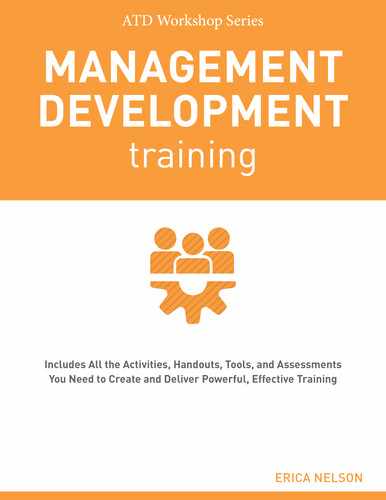Develop Winning Managers—the Heart of the Team Frontline managers are an organization’s first level of management: the “people managers” across its business operations and functions. Developing frontline managers is key to an organization’s overall health and prosperity. The latest book in ATD’s successful Workshop Series, Management Development Training offers trainers of all expertise levels the tools and strategies necessary for delivering powerful professional development training for frontline managers. Through Management Development Training, training facilitators can apply ATD’s research-based ACCEL Model—a management framework that includes five core skills necessary for managerial success (accountability, collaboration, communication, engagement, and listening and assessing)—to take new and experienced managers beyond their roles as the centers of their teams to the powerful roles as the hearts of their teams. This workshop volume demonstrates how the development of these skills can help managers positively impact every member of their team. With expert management trainer Erica Nelson as your guide, choose between uniquely designed two-day and three-day workshops. Everything you need for workshop design and delivery is included: agendas, assessments, handouts, tools, learning activities, and PowerPoint slides. Chapters also cover customizing your own workshop, conducting needs analysis, facilitating, design and delivery, and evaluating your workshop results.
Table of Contents
- Cover
- Half Title Page
- Title Page
- Copyright
- Contents
- THE ATD WORKSHOP SERIES
- INTRODUCTION: HOW TO USE THIS BOOK
- Why Is Management Development Training Important?
- Workshop Development
- Two-Day and Three-Day Workshop Objectives
- What Do I Need to Know About Training?
- How Much Time Will Preparation Take?
- What Are the Important Features of This Book?
- How Are the Agendas Laid Out?
- How Do I Use This Book?
- Key Points
- What to Do Next
- SECTION I: THE WORKSHOPS
- 1 THREE-DAY MANAGEMENT DEVELOPMENT WORKSHOP
- Three-Day Workshop Objectives
- Three-Day Workshop Overview
- Day 1 Overview
- Day 2 Overview
- Day 3 Overview
- Three-Day Workshop Agenda: Day 1
- What to Do Between Workshop Days
- Three-Day Workshop Agenda: Day 2
- What to Do Between Workshop Days
- Three-Day Workshop Agenda: Day 3
- What to Do Next
- 2 TWO-DAY MANAGEMENT DEVELOPMENT WORKSHOP
- Two-Day Workshop Objectives
- Two-Day Workshop Overview
- Day 1 Overview
- Day 2 Overview
- Two-Day Workshop Agenda: Day 1
- What to Do Between Workshop Days
- Two-Day Workshop Agenda: Day 2
- What to Do Next
- 3 CUSTOMIZING THE MANAGEMENT DEVELOPMENT TRAINING WORKSHOPS
- Customizing the Content and Activities
- Customizing the Workshop Format
- Management Development Skills Series
- Small Bites—Lunch & Learn Seminars
- Customizing Delivery With Technology
- The Bare Minimum
- What to Do Next
- SECTION II ESSENTIALS OF EFFECTIVE MANAGEMENT DEVELOPMENT TRAINING
- 4 IDENTIFYING NEEDS FOR MANAGEMENT DEVELOPMENT TRAINING
- Why Needs Analysis?
- Strategic Needs Analysis
- Structured Interviews
- Focus Groups
- Surveys
- Individual Learning Needs Analysis
- The Bare Minimum
- Key Points
- What to Do Next
- Additional Resources
- 5 UNDERSTANDING THE FOUNDATIONS OF TRAINING DESIGN
- Basic Adult Learning Theory
- Adult Learning Theory and E-Learning Design
- Designing for Accessibility
- Theory Into Practice
- Establishing a Framework
- Identifying Behaviors
- Practicing
- Providing Feedback
- Making It Relevant
- The Bare Minimum
- Key Points
- What to Do Next
- Additional Resources
- 6 LEVERAGING TECHNOLOGY TO MAXIMIZE AND SUPPORT DESIGN AND DELIVERY
- Why Consider Learning Technologies?
- Opportunities to Use Learning Technologies
- The Bare Minimum
- Key Points
- What to Do Next
- Additional Resources
- 7 DELIVERING YOUR MANAGEMENT DEVELOPMENT WORKSHOP: BE A GREAT FACILITATOR
- The Learning Environment
- Program Preparation Checklist
- Participant Materials
- Handouts
- Presentation Slides
- Workbooks and Journals
- Fillable PDF
- Digital Media
- Toys, Noisemakers, and Other Props
- Facilitator Equipment and Materials
- A Strong Start: Introduction, Icebreakers, and Openers
- Feedback
- Role Plays
- Participant Presentations
- Ball Toss
- Journaling
- Responding to Questions
- Training Room and Participant Management
- A Word About Dealing With Difficult Participants
- An Unforgettable End
- The Bare Minimum
- Key Points
- What to Do Next
- Additional Resources
- 8 EVALUATING WORKSHOP RESULTS
- Levels of Measurement
- Level 1: Measuring Participant Reactions
- Level 2: Measuring the Extent to Which Participants Have Learned
- Level 3: Measuring the Results of Training Back on the Job
- Level 4: Measuring the Organizational Impact of Training
- Return on Investment
- Reporting Results
- The Bare Minimum
- Key Points
- What to Do Next
- Additional Resources
- SECTION III: POST-WORKSHOP LEARNING
- SECTION IV: WORKSHOP SUPPORTING DOCUMENTS AND ONLINE SUPPORT
- 10 LEARNING ACTIVITIES
- Learning Activities Included in Management Development Training
- 11 ASSESSMENTS
- Assessments Included in Management Development Training
- 12 HANDOUTS
- Handouts Included in Management Development Training
- 13 ONLINE SUPPORTING DOCUMENTS AND DOWNLOADS
- Access to Free Supporting Materials
- Customizable Materials
- Working With the Files
- ADDITIONAL RESOURCES
- ABOUT THE AUTHOR
- Back Cover
